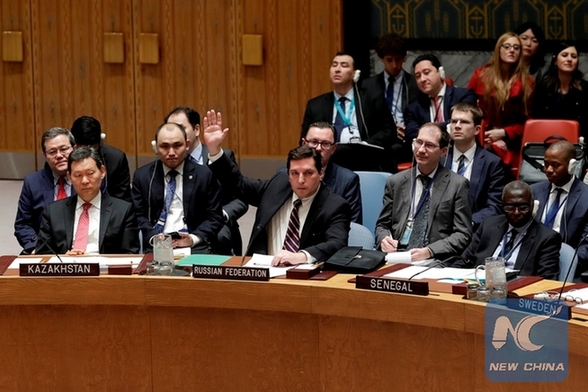US-Russia tiff and peace in Syria
- By Sajjad Malik
 0 Comment(s)
0 Comment(s) Print
Print E-mail China.org.cn, April 17, 2017
E-mail China.org.cn, April 17, 2017
|
|
|
Vladimir Safronkov (C, front), Russian deputy ambassador to the United Nations, vetoes a Security Council draft resolution on Chemical Attack in Syria, at the UN headquarters in New York, April 12, 2017. [Photo/Xinhua] |
An agreement between Russia and the U.S. is essential to successfully deal either with Assad or IS. Given the current state of trust between the two powers, it may take months before they see eye-to-eye on the two issues.
The U.S. and Russia are the leading stakeholders in this more than six-year old conflict. Their support or vice versa to a set of clients is crucial in the ongoing civil war that, according to various estimates, has killed more than 400,000 people.
There was plenty of hope during the run up to presidential elections in the U.S. that the victory of Donald Trump might help create a greater understanding with Vladimir Putin to have a common front against the Islamic State. The cooperation was expected to lead to an even bigger understanding on the future role of Assad.
The situation has changed dramatically following the strikes by the U.S. after the alleged chemical weapons attack by Syrian regime against the civilians. The Americans were livid that it could have happened with the knowledge of the Kremlin. Rex Tillerson accused the Russians of complicity or incompetence.
Russia had helped secure a deal in 2013 after a chemical weapons attack that Assad would surrender all chemical weapons. If the American's version of the story is correct, then it showed the failure on the part of Putin.
However, Russia has rejected all American claims that Assad was responsible for the attack and instead accused the rebels for it. It has also accused America of violating international law. An impartial probe can help to fix the responsibility but so far there is no agreement on it.
The prevailing scenario is of antagonism and suspicion. Rex Tillerson's visit also failed to unfreeze the situation. His meetings with Sergei Lavrov and President Putin were limited to reiterating the stated positions. The body language of both sides showed anger and frustration.
Even before the start of Tillerson's visit, the Americans were openly saying that ties with Russia were at their "lowest level." It has also been echoed by Moscow which said that the relationship has worsened.
The question of peace in this context of acrimony and strong mistrust loses its meanings. Both sides have raised the bargaining chips and any compromise or cooperation on the political ambitions of Assad has become more difficult.
In fact, the Trump administration has hardened its stance towards Assad. Initially, the officials were willing to discuss peace with Assad still in power. But the new rhetoric counts him as the main hurdle in the way of permanent peace.
Russia's problem is that Syria under Assad is the only reliable ally in the volatile Middle East. By agreeing to the American pleas that Assad is part of the problem and should be removed, Russia would lose its last foothold in the strategic region.
It means that Russia would never agree to ditch Assad unless America is ready to give it some space on other issues, like Ukraine, Crimea and NATO. Since any agreement on these issues is even harder than Syria, the differences will continue and any chance for peace in Syria will remain a wild goose chase.
The other main issue is how to have a common front against the extremists groups, especially IS. Both Russia and the U.S. have a shared interest to dismantle this outfit as it poses a direct threat to both countries. Ideally, they should sit together and have a plan to wipe out this threat.
But the political complexity creeps in and makes simple cooperation against a militant group difficult. It is believed that the elimination of IS would mean making Assad even more powerful. Hence, a victory of Russia by proxy. Why America should cooperate to scuttle the Islamic State, if it would mean a defeat in the strategic game plan?
Remember, the survival of Assad also means victory of Iran and Hezbollah. It also means an increasing threat to Saudi Arabia and Israel.
Sajjad Malik is a columnist with China.org.cn. For more information please visit:
http://www.china.org.cn/opinion/SajjadMalik.htm
Opinion articles reflect the views of their authors, not necessarily those of China.org.cn.







Go to Forum >>0 Comment(s)